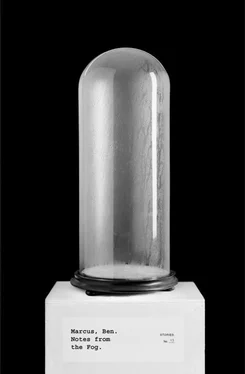“I’m sorry to report your loss,” the voice said.
Then don’t, thought George. Keep it to yourself.
—
He guessed he knewhe’d get a call like this one day, and he guessed he’d have to think about it for a while, because the initial impact felt mild, even irritating. He’d have to stick his head into the dirty, hot, self-satisfied state of California and try not to drown in smugness while he solved the problem of his father’s body, which he hadn’t particularly cared for when his father was alive. But what was most on his mind was this question of kin, and why they had not made another call first.
There was a sister, but she’d scored out of the family. It was hard to blame her. Better food, prettier people, sleeker interiors. George read about her now and then online. She’d achieved a kind of fame in the world of industrial materials. At some point she’d promoted her ridiculous middle name, Pattern, to pole position. Like Onan, maybe. Or Pelé. Her old name, Elizabeth, George figured, was holding her back, and in a way he couldn’t blame her, given the sheepish Elizabeths he’d privately failed to grant human status in college. Sleepwalkers, enablers, preposterously loyal friends. Pattern was a family name belonging to their great-grandmother, who lived on a brutally cold little island, and who, according to their mother, had made a sport of surviving terminal illnesses. Now George’s lovely sister Pattern, so many years later, was a person, a business, a philosophy, a crime. She did something in aerospace. Or to it. Had his brilliant sister once said, in a Newsweek profile, that she wanted to “help people forget everything they thought they knew about the earth”? One such bit of hypnosis had apparently resulted in immense profits for her, the kind of money you could get very paranoid about losing. She produced shimmering synthetic materials from terribly scarce natural resources—a kind of metal drapery that served as “towels” for drones—which meant Pattern was often photographed shaking hands with old people in robes on the tarmacs of the world, no doubt after administering shuddering hand jobs to them back on the airbus.
Well, that wasn’t fair. Probably, George figured, her staff conducted proclivity research so that it could provide bespoke orgasms to these titans of industry, whose children Pattern was boiling down for parts, whose reefs, mines, and caves her company was thoroughly hosing.
At home Pattern was probably submissive to a much older spouse, whose approach to gender was seasonal. Or maybe his sister wasn’t married? It was difficult to remember, really. Perhaps because he had probably never known? Perhaps because Pattern did not exactly speak to any of the old family? Ever?
Now, with Mother in a Ball jar and Dad finally passed, George was the last man standing. Or sitting, really. Sort of slumped at home in the mouth of his old, disgusting couch. Trying to figure out his travel plans and how exactly he could get the bereavement discount for his flight. Like what if they tested him at the gate with their grief wand and found out, with digital certainty, that he super sort of didn’t give a shit?
His most recent contact with his sister was an email from soldier1@pattern.com, back when her rare visits home were brokered by her staff, who would wait for their boss in a black-ops Winnebago out on the street. Ten years ago now? His mother was dead already, or still alive? At the time George wondered if Pattern couldn’t just send a mannequin to holiday meals in her place, its pockets stuffed with money. Maybe make it edible, the face carved from meat, to deepen the catharsis when they gnashed it apart with their teeth. Anyway, wouldn’t his sister like to know that there was now one less person who might make a grab for her money? She could soften security at the compound, wherever she lived. Dad was dead. Probably she already knew. When you’re that wealthy, changes in your biological signature, such as the sudden omission of a patriarch, show up instantly on your live update. You blink in the high-resolution mirror at your reflection, notice no change whatsoever, and then move on with your day. Maybe she’d have her personal physicians test her for grief later in the week, just to be sure.
The question now was how to fire off an email to his very important sister that would leapfrog her spam filter, which was probably a group of human people, arms linked, blocking unwanted communications to their elusive boss, who had possibly evolved into a smoke by now.
Simple was probably best. “Dear Pat,” George wrote. “Mom and Dad have gone out and they are not coming back. It’s just you and me now. Finally we have this world to ourselves. P.S. Write back!”
—
George went to Californiato pack his father’s things, intending a full-force jettison into the dumpster. He’d only just started surveying the watery one-bedroom apartment, where he could not picture his father standing, sitting, sleeping, or eating, mostly because he had trouble picturing his father at all, when a neighbor woman, worrisomely tall, came to be standing uninvited in the living room. He’d left the door open and cracked the windows so the breeze could do its work. Let the elements scrub this place free of his father. He needed candles, wind, a shaman. And on the subject of need: after sudden travel into blistering sunshine, he needed salty food to blow off in his mouth. He needed sex, if only with himself. Oh, to be alone with his laptop so he could leak a little cream onto his belly. Now there was a trespasser in his father’s home, suited up in business wear. It was enormously difficult to picture such people as babies. And yet one provided the courtesy anyway. An effort to relate. Their full maturation was even harder to summon. He was apparently to believe that, over time, these creatures, just nude little seals at first, would elongate and gain words. A layer of fur would cover them, with moist parts, and teeth, and huge pockets for gathering money. Was there a website where the corporate Ichabods of the world showed off their waterworks, gave each other rubdowns, and whispered pillow talk in an invented language? Perhaps a new category beckoned.
“Oh my god. You can’t be George,” the woman said.
George sort of shared her disbelief. He couldn’t be. The metaphysics were troubling, if you let them get to you. But day after day, with crushing regularity, he failed to prove otherwise.
The woman approached, her nose high. Examine the specimen, she possibly thought. Maybe draw its blood.
“I can’t believe it!”
He asked if he could help her. Maybe she wanted to buy something, a relic of the dead man. The realtor had said that everything had to go. Take this apartment down to the bones.
So far, George was just picking at the skin. He was looking through his father’s takeout menus, skimming the man’s Internet history. There were items of New Mexican pottery to destroy, shirts to try on.
Maybe he’d dress up like his father and take some selfies. Get the man online, if posthumously. If no one much liked him when he was alive, at least the old man could get some likes in the afterlife. Serious.
The woman remembered herself.
“I’m Trish, Jim’s… you know.”
“Uh-huh,” George said.
“I won’t even pretend to think he might have told you about me,” Trish said. “It’s not like we were married in any real official way. At least not yet.”
Oh god. A half wife.
The last time he spoke to his father—months ago now—George remembered not listening while his father said he had met someone, and that she—what was it?—provided the kind of service you didn’t really get paid for, or paid enough, because damn this country! And that this new girlfriend was from somewhere unique, and George knew to act impressed. Certainly his dad had seemed very proud, as if he’d met some dignitary from another planet.
Читать дальше











